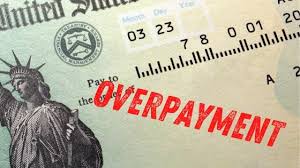 The Social Security Administration (“SSA”) assesses overpayments in any instance where it thinks it may have overpaid benefits. This most commonly occurs when a recipient doesn’t timely report a change in circumstances, such as income.
The Social Security Administration (“SSA”) assesses overpayments in any instance where it thinks it may have overpaid benefits. This most commonly occurs when a recipient doesn’t timely report a change in circumstances, such as income.
In many cases, the overpayment may be caused by the SSA itself, when it fails to update its records after receipt of a change in circumstances. Or the SSA may deposit benefits into someone else with a similar name. There is no way for beneficiaries to independently verify whether they are receiving the correct amount of benefits every month and instead they must rely on the SSA’s calculations.
Overpayments can be made over a lot of years – even 20-30 years. Frequently, a mistake is caught and a handful of years have gone by, and the money has long been spent, usually on reasonable and necessary living expenses.
However, once a disparity is found by the SSA, it will assess an overpayment and will send the beneficiary a letter demanding full repayment within 30 days. In cases of non-payment, the SSA quickly escalates the matter to include federal litigation, wage garnishment, withholding of benefits and negative reports to credit agencies.
There is a waiver opportunity where someone can request a hearing, but the test is nearly impossible to meet. A beneficiary must prove that he/she was not at fault for the overpayment (with records from years ago that no longer exist) AND that repayment would be against “equity and good conscience” or “defeat the purposes” of Social Security. These are tough burdens to prove, and rarely successful.
But there is a silver lining. These SSA payments are dischargeable in a bankruptcy. The Bankruptcy Code gives not special priority to Social Security overpayments, unlike taxes and federal student loans. A debtor does not have to ask for waiver first. You merely have to list SSA as a general unsecured creditor — just like a credit card company.
The SSA does not penalize debtors who have had past SSA overpayments discharged, there is no future offset against social security income, and no one should reaffirm this debt under threat of such action.
In the rare case where the SSA believes that the debtor is at fault — usually in a fraud situation, they have the ability to file an adversary complaint in the bankruptcy court under Section 523(a)(2)(A); 523(a)(2)(B) or 523 (a) (6). So they have three arguments to use.
First, under the (a)(2)(B) argument, the SSA must show the debtor used a materially false written statement regarding their financial situation that the SSA reasonably relied. If no writing exists, the SSA will likely lose this argument.
Second, under (a)(2)(A), the SSA can try to show that the debtor omitted telling the SSA about the increase in income or other financial circumstances. Courts have upheld the SSA’s position where it can show that the debtor was aware of his/her duty to report the change in circumstances, but failed to notify the SSA. This may be a very difficult standard due to the debtor’s cognitive abilities — after all, the debtor is likely, but not always of advanced age.
The third and final way the SSA can pursue an overpayment in bankruptcy under Section 523(a)(6) is when it can show blatant fraud through a willful and malicious injury to the SSA. This is quite rare and reserved for only the most egregious cases such as someone faking a disability for a period of years, while working under the table so to speak.
The bottom line, in most cases, the Social Security overpayment is discharged. But having a competent bankruptcy attorney on your side is a very good idea!!
 Reboot Your Life: Tampa Student Loan and Bankruptcy Attorney Blog
Reboot Your Life: Tampa Student Loan and Bankruptcy Attorney Blog


